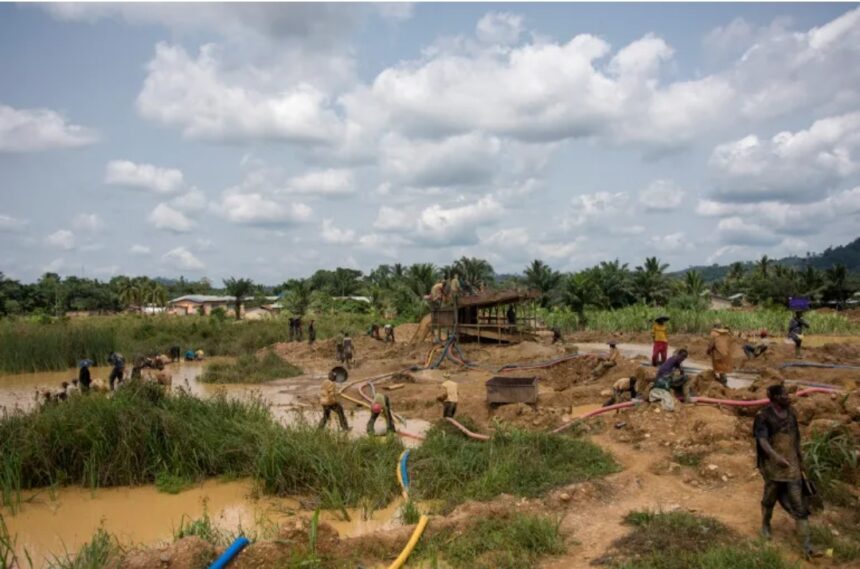When activist Oliver Barker Vormawor saw reports in September that Ghana’s water agency would not be able to supply some parts of the country with water due to extreme contamination of main rivers from small-scale mining activities, he knew he had to do something.
Later that month, Vormawor and dozens of other concerned Ghanaians took to the streets in the capital city, Accra, to protest against what they said was President Nana Akufo-Addo’s inaction to stop a “looming environmental catastrophe”. They were determined to put the matter on the ballot ahead of the hotly contested December general elections. But rather than get a reaction to their demands, Vormawor and several of his comrades were arrested and imprisoned for weeks on charges of illegal assembly.
Now, although Akufo-Addo’s New Patriotic Party (NPP) was voted out, activists like Vormawor say they have just as little faith in the new president, John Mahama, and his ability to keep the mounting pollution of Ghana’s rivers and soil in check.
“There isn’t any roadmap yet from Mahama on how to tackle the problem,” Vormawor, who once served at the United Nations as a legal officer, told Al Jazeera. “It’s really difficult to say that his government will be more aggressive on this because even as the opposition party, they were very tentative and uncomfortable taking up the issue,” he added, referring to Mahama’s National Democratic Congress (NDC).
Formerly called the “Gold Coast”, the West African nation is bending under pressure from widespread, incessant small-scale mining of the shiny metal. Much of that artisanal activity falls under what locals call “galamsey”, or in full “gather them and sell”. The term once referred to illegal mining, carried out by mostly untrained young men and women, but now more loosely encompasses licensed small-scale operations that mine unsustainably.
Officials allegedly complicit in galamsey
Galamsey has been in practice for many years, but prices of gold that rose globally to an all-time high (close to $3,000 per gram) in late 2024 caused a corresponding surge in illegal mining across Ghana, and in effect, more intense devastation of water bodies.
Small-scale miners use lots of water by digging up soil around riverbeds in forested areas and washing it off to reveal gold ore. They use toxic chemicals such as mercury and cyanide to separate the gold from the ore, and those chemicals flow into rivers that hundreds of communities depend on for drinking and domestic use. Some people say they earn about $70 to $100 a day.
By 2017, more than 60 percent of the country’s water bodies were already polluted by mercury and other heavy metals, turning once-clear rivers a murky brown, according to the country’s Water Resources Commission. The chemicals, which can damage lungs, are affecting thousands of acres of farmlands. Ghana’s Cocoa Board (COCOBOD) said it lost 2 percent of the total cocoa cultivation area to mining. Some farmers allege that galamsey operators buy off their land or intimidate them into selling.
“This is a problem that has been going on for decades now, but it’s a problem that’s escalating fast and this has created a sense among Ghanaians that we are running out of time to protect our country and our people,” Ewurabena Yanyi-Akofur, country director of the nongovernmental organisation WaterAid, told Al Jazeera.
“While illegal gold mining was happening mainly in the south of the country, our research shows that it’s now endemic in the north. The presence of mercury and other toxins in water is leading to skin diseases and other health crises,” she added.
In a 2024 report, WaterAid warned that Ghana might have to import water by 2030 in a business-as-usual scenario as drinking water sources shrink.
Activists are particularly angry at LI 2462, an Akufo-Addo-era law that passed in November 2022, which allowed for mining concessions to be allocated in the country’s biodiversity hotspots, including protected forests. A previous policy limited mining in forests and protected reserves to about 2 percent of their total area.
Many activists at the time denounced the law and called attention to the fact that the country lost the equivalent of 30,000 football fields to deforestation for logging, agriculture, and illegal mining of gold and other minerals like bauxite that year.
However, the government pushed ahead with the law and proceeded to approve mining licences – for exploration, industrial operations, and small-scale mining, at an unprecedented rate. Where officials gave out an estimated 90 licences between 1988 and early 2017, at least 2,000 more were given out between September 2017 and January 2025, according to data from the Ghana Mining Repository. That period falls under Akufo-Addo’s tenure. Most licences were for small-scale mines, and key reserves like the Nkrabia Forest Reserve, west of Accra, and the Boin Tano Reserve, located in the country’s Western Region, were among those allocated.
Anger against the Akufo-Addo government intensified after it surfaced that some of the companies newly licensed under LI 2462 belonged to high-placed politicians and members of Akufo-Addo’s NNP party and that some of those people were also running illegal mines.
In April 2023, an explosive report by former Environment Minister Kwabena Frimpong-Boateng to Akufo-Addo leaked to the public. In it, Frimpong-Boateng accused “many party officials … their friends, personal assistants, agents, relatives” of engaging in illegal mining. He accused, among others, Gabby Asare Otchere-Darko, an influential businessman and relative of Akufo-Addo, of interfering in the arrest of mining companies that destroyed forests.
“It was an open secret that they were using this as a way to raise money for the party, that officials would get their own little corners,” Vormawor, the activist, told Al Jazeera. Activists like him say the proliferation of small-scale mining attracted more illegal mines, as the government failed to set standards and ensure supervision.
The Akufo-Addo government denied the allegations levelled in the Frimpong-Boateng report and said it was a catalogue of “personal grievances” with no evidence. In October 2024, the administration deployed the military across water bodies in the country to crack down on illegal miners under a special “Operation Halt”.
New president, but little hope
Still, the results of galamsey are glaring. On January 2, the Ghana water agency again shut down a water treatment plant, this time in the western Tarkwa-Nsuaem region, due to severe pollution of the River Bonsa, which provides drinking water for more than 200,000 people in the area. It was the second time in five months authorities were forced to cut supply.
President Mahama, who was sworn in for a second time into office on January 7, has promised to “reset” Ghana and deal with illegal mining.
In an interview with Voice of America days after his sweeping win in the December elections, Mahama said his government would prioritise passing a law to ban mining in forest reserves and areas close to water bodies. He also promised that his administration would work with the country’s Environmental Protection Agency (EPA) to clean up polluted rivers of effluents and heavy metals.
However, the president stopped short of promising to reverse the small-scale licences recently approved, or to put a hold on new concessions, pointing out that it provides a means of livelihood.
“People need to distinguish between small-scale mining and illegal mining: small-scale mining is legal,” the president said. “There are ways of doing it without destroying the environment in Canada, Australia, and the United States. Technology exists. So why don’t we … train our people to do mining in a way that is safe for the environment? We’re willing to consider those things.”
Mahama first led the government for four years between 2012 and 2016. At that time, galamsey was already an issue, although his administration is credited for banning mining in forest reserves.
Still, some accused Mahama’s administration of failing to check the influx of Chinese nationals who poured into Ghana to invest in small-scale mining equipment such as soil excavators and who worked alongside Ghanaian locals. In 2013, the Ghana Immigration Service deported more than 4,500 Chinese nationals after raids on illegal mines. Now, much of the illegal mining is done by Ghanaians.
Activist Vormawor said he does not expect much from the Mahama government because of his administration’s “weak action” in his first presidency. The president, he said, ought to repeal the controversial Akufo-Addo law and several licences and declare a state of emergency. Without those measures, Vormawor said, he will not stop protesting.
“Yes, there is small-scale mining and there is illegal mining, but most of it is simply irresponsible mining,” the activist said. “The work does not end yet because there’s a looming crisis, and we must draw a line between people having a livelihood and damaging the environment.”
Email Us on editorial@nnafrica.com













